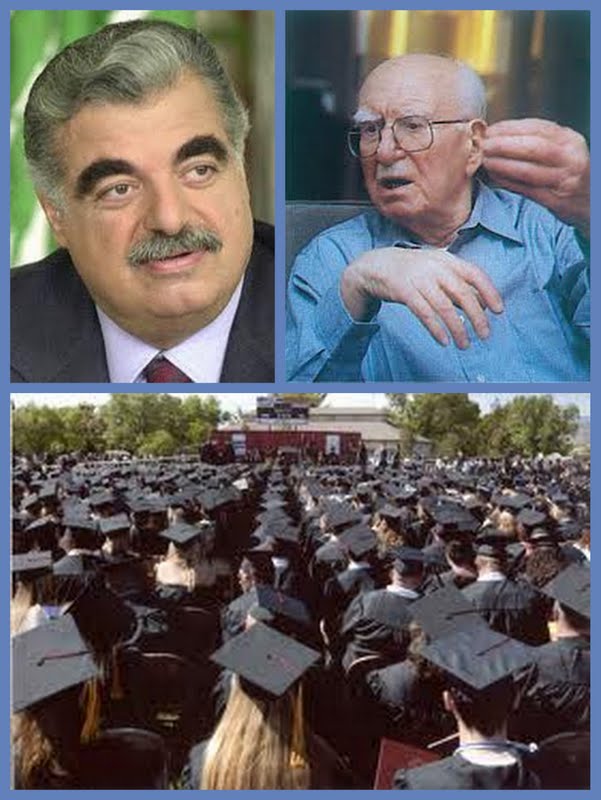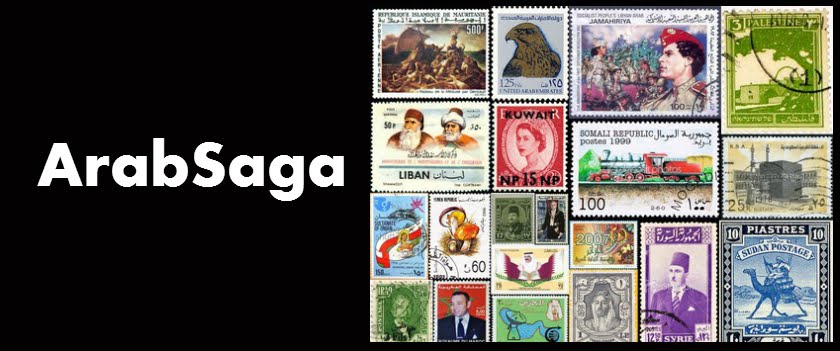 |
| Constantine "Costi" Zurayk |
(The following is the last of three posts Fawaz Najia had ready but did not have time to publish before he lost his battle with cancer on April 20)
The AUB years were the best years in my life. And I owe them to one man: Constantine (“Costi”) K. Zurayk (1909-2000).
The AUB years were the best years in my life. And I owe them to one man: Constantine (“Costi”) K. Zurayk (1909-2000).
He
was an intellectual and moral giant whose generosity funded my undergraduate
years at the American University of Beirut.
My
first concern, after enrolling at AUB in 1954 and managing to settle my first
semester tuition, was finding a sponsor to fund the ones after. My parents couldn't possibly have managed three years of university
education for me.
My
big break for the second semester was winning a scholarship for needy students granted
by Zurayk. I held on to the Zurayk Endowed Scholarship for another four
semesters leading up to my graduation. The scholarship covered my tuition fees
in full -- plus a small allowance.
I was
three months into my sophomore year when Zurayk became acting president of AUB
following the sudden death of President Stephen B. L. Penrose in
December 1954. He kept the position until the July 1, 1957 Commencement
ceremony. J. Paul Leonard assumed office as president of AUB and I received my
“Bachelor of Arts with Distinction” in economics on that day.
The
degree landed me a decent job, which in turn allowed me to fund my postgraduate
studies gradually and pick up my Masters in economics in 1962.
When
I first applied for the need-based Zurayk Endowed Scholarship, I had to
complete a financial aid form showing I could not meet the cost of tuition. My
classmate George T. Yacoub, a sheer Ras Beiruti, was looking to fill a similar
form for another need-based scholarship. He suggested we turn to the mukhtar (district chief) of Ras Beirut, Jirji Rubeiz. His office was at the joint
of Jeanne d’Arc and Mak’hool streets, some 200 meters from AUB’s Main Gate.
An
affable and witty man, mukhtar Rubeiz
knew the circumstances of every resident family in Ras Beirut. He quickly gave
us two signed and sealed documents on his letterhead. Each stated in his
handwriting: “I, mukhtar Jirji Rubeiz,
by this certify that (name) has no funds or property.” His crisp statement won
us the scholarships.
Zurayk
was born to a Christian Arab family in Damascus in April 1909. He received his
Bachelor of Arts from AUB in 1928, his Doctor of Laws from the University of
Chicago in 1929 and his PhD from Princeton University in 1930. In nearly 50
years at AUB, he served as Professor and Distinguished Professor of History and
Arab History, as Emeritus Professor of Arab History and Archaeology and as Vice
President and Acting President.
His
major work was Ma’na an-Nakba (The Meaning of the Disaster). Published
in 1948, the book offered the first major intellectual critique of Arab society.
Zurayk’s
lifelong concern was the issue of reform and how to move the Arabs from their
"backward" state into the modern world.
“Our problems in Arab society are…
problems of culture and civilization."
His identification
of the ills of Arab society and his advocacy of education
as the best tool for reform remain enshrined in my mind.
So
are the values of liberty, diversity independence, democracy, justice,
education, human rights and free enterprise. Zurayk and other faculty members –
chiefly Cecil Hourani, Yusuf
K. Ibish, James Batal, Yusuf A. Sayegh and Paul
J. Klat -- instilled these in me.
Perhaps
the best time I could “give back” to Zurayk was at university by:
-- Topping
all students in the School of Arts and Sciences in my senior year with a grade average
exceeding 90 percent.
-- Serving
successively as president of the Economics Society, president of the Civic
Welfare League and editor in chief of Outlook, the student weekly.
-- Setting new AUB weightlifting records at the 1957 Field Day (see
“Brawn and Brains” posted on ________).
More importantly,
he must have felt gratified when he wrote me this letter dated 13 June 1957:
“Dear Mr. Najjiya,
“I am happy to inform
you that the Board of Academic Deans has approved the recommendation of the
Dean and Faculty of Arts and Sciences that you be granted the Penrose Award for
the academic year 1956-1957.
“This award is granted
to the outstanding student of each of the four Faculties of the University, on
the basis of scholarship, character, leadership and contribution to university
life.
“Your name will be engraved
on the Plaque which has been donated by Mrs. Penrose in memory of the late
President, Dr. Stephen B. L. Penrose Jr.
“In communicating this
action to you, I wish to express my sincere congratulations and my best wishes
for the future. It is our firm hope that your record after you graduate will
reflect credit on yourself, your Alma Mater and your country.
“Sincerely yours,
(Signed)
“C. K. Zurayk
“Acting President”
Growth
of the financial aid program at the University over the years is remarkable. For
example, 2,765 students -- or 36% of the total enrolled in 2008-2009 – received
$11.6 million in financial aid, mostly as need-based grants. That’s an average
of $4,195 for each recipient. An extra $4 million funded graduate assistantships
and student employment. Credit goes to the generous support of AUB alumni,
former students and friends.
Many
people choose other ways to “give back.” Mahmoud Z. Malhas, a dear friend and fellow
1957 graduate in economics whose scholarship benefactor was Vice President
Archie S. Crawford, “gave back” to AUB through a $600,000 gift to renovate the
Common Room. The newly named Mahmoud Malhas Common Room, which serves a multipurpose
student area in West Hall, opened in November 2008. Mahmoud had also contributed
toward rebuilding College Hall in the 1990s.
My
and Mahmoud’s midfifties “rat pack” included engineering
graduate Suhail Bat’heesh, among
others. Suhail, who passed away in
March 2001, “gave back” from the grave. In his memory, his widow Etaf gave $440,000 to renovate the
West Hall Theater. The New Suhail R. Bat’heesh Auditorium launched in February 2003.
 |
| Rafic Hariri, Costi Zurak and AUBites |
His
son, Prime Minister and Trustee Saad-Eddeen
Rafic Hariri, elected “to honor
the memory of his late father by naming and endowing the Rafic Hariri School of
Nursing at AUB.” His gift covered
costs to renovate and equip the new building, set up a faculty chair in nursing
and bankroll Hariri Scholarships for nursing students.
Rafic Hariri has left a legacy of philanthropy through the Hariri Foundation, which he
set up in 1979. It testifies to the importance he gave to the quality education
of future generations. So far, the Hariri Foundation has helped educate more
than 35,000 Lebanese students in the finest universities at home and abroad,
including the United States, France, the United Kingdom and Canada.
****
 |
| The late Prime Minister Rafic Hariri |
On 16 December 1996, the “Friends of Lebanon” conference –
co-chaired by the United States and Hariri -- was held at the State Department
in Washington. Some 30 nations and eight international financial
institutions attended the conference intended to solicit pledges to finance rebuilding
Lebanon.
I
thought Mideast Mirror, which went out
to subscribers in the early afternoon London time, had to cover the Washington
event in good time. The full text
of Hariri’s opening speech would be a fitting curtain raiser.
I rang seasoned
political writer Khairallah Khairallah (KK to his friends) in London. I asked
him if he had a phone number for any Hariri aide in Washington who could give
me a copy of the speech. He said he only had one for the hotel where the team
was staying.
I
waited a couple of hours until it was midday in London and dialed Washington.
I heard
“Hello” at the other end of the line from the sleepy voice of the late prime
minister just waking up. I hesitated for a second before saying “Sorry Mr.
Prime Minister for waking you up.”
He
said, “No problem, but who are you? What do you want?”
I explained
the reason for my call.
He
said, “If I gave you the text of my speech at this hour of day, it means it
will be released before delivery.”
I said,
“Sir, we shall type the text, proofread it and lay it out. But release of the
newsletter will be embargoed until your speech delivery.”
He
said, “Fine. Do you know Nouhad Mashnouq (who
was his bureau chief at the time)?”
“Yes
Mr. Prime Minister, I do.”
“Do you
have a fax machine?”
“Yes
sir, I do.”
“Then please
ring Nouhad on this number (which he gave me), tell him you woke me up and ask
him to fax you the speech. He’ll do it right away.” And Mashnouq did.
The
“Friends of Lebanon” conferees pledged $1 billion in near term investments for rebuilding Lebanon
and another $2.2 billion in long-term investments. Washington’s contribution included
development aid, agricultural credits and $2.1 million in grants for AUB.
Good
men like Hariri and Zurayk never die.









